THE POWER OF SOCIAL MEDIA




Edition 49 | MAY 2023 OVER 4 MILLION MAGAZINE READS AND COUNTING... THE UK’S #1 TAXI NEWS SOURCE ELECTRIC TAXI INSURANCE TRENDS DRIVER VAT
LAWS LATEST EDITION
NEW
NEW APPS
TaxiPoint Chief Editor:
Perry Richardson
TaxiPoint Publishing & Advertising Manager:

Lindsey Richardson
Visit us online at:
www.taxi-point.co.uk

Write to us at: contact@taxi-point.co.uk

Advertising enquiries at: advertising@taxi-point.co.uk
The publishers reserve the right to refuse, withdraw, amend or otherwise deal with all advertisements without explanation. All advertisers must comply with the British Code of Advertising practice.
The views expressed in this publication are not necessarily those of the publishers.
All written and image rights are reserved by the author as displayed. Reproduction in whole or in part without prior permission from the publisher is strictly prohibited.


Copyright brand TaxiPoint 2023. Creative Common image licenses displayed where applicable.
FROM THE EDITOR
PERRY RICHARDSON
MAINSTREAM NEWSSTAND
Hello and welcome to our May 2023 edition of TaxiPoint.
Last month saw new, and much needed, legislation enter the industry in England in the guise of a mandatory revoked licence database. The simple and costeffective checks will help provide more confidence to passengers, and also make sure the bad apples that frequent any section of community cannot return back behind the wheel of a cab before serving relevant bans.

For TaxiPoint it has been an exciting month especially when it comes to this magazine. I’m glad to say TaxiPoint has become the first industry publication to have been accepted onto the global mainstream digital newsstand that is PressReader.
As of their latest published figures, PressReader has 12 million monthly active users. With
a total network reach of over 300 million, PressReader helps publishers like TaxiPoint to grow their audience, helps brands engage with their customers, and gives readers unlimited access to the stories they want.
The platform provides a digital newsstand to customers using some of the world’s biggest hotels and airlines. The deal with PressReader will further TaxiPoint’s position as the industry’s number one taxi news provider and widen reach both in the UK and worldwide.
And the good news doesn’t stop there, you can also now find the TaxiPoint magazine on the widely read Magzter newsstand too!
Be lucky!
TaxiPoint Editor and Founder
2 | TAXIPOINT | MAY 2023 | EDITION 49 WWW.TAXI-POINT.CO.UK
INSURANCE TREND
ELECTRIC TAXI DRIVERS LOOKING AT QUALITY OF POLICY RATHER THAN COST

expert.
The insight came as Rob Leyland joined Patons Insurance to become their new National Taxi Sales Manager in February of this year.
Having worked in the business of insuring taxis since 1999, Leyland spoke about the ongoing move to zero emissions capable technology throughout the UK.
Leyland said: “The biggest difference will be the switch to EVs, which is happening more quickly in some areas compared to others, but we are all aware of the 2030 deadline. It will happen, but it might take a bit longer in niche industries such as taxi insurance.

they are well looked after and drivers are careful to make sure their private hire insurance or public hire insurance will cover them and protect their business in the event of a claim.
“We are finding that drivers are going for quality, rather than the cheapest policy, although cost obviously comes into it. They want the best taxi insurance they can afford and this is why I want to make sure quality is key to everything we do. We are transparent with everything and the aim is to make the customer happy.
“There are obviously things that are beyond our control, such as delays with parts for repairs, but we stay on top of claims and make sure the customer knows what is going on.”
3 | TAXIPOINT | MAY 2023 | EDITION 49 WWW.TAXI-POINT.CO.UK
. IMAGE CREDIT: LEVC
VAT
WHAT IS FLAT RATE VAT AND HOW CAN IT IMPACT TAXI AND PHV DRIVERS?
If you are a taxi driver or a private hire operator, you may be wondering what is flat rate VAT and how could it benefit your business.
Flat rate VAT is a simplified scheme that allows you to pay a fixed percentage of your turnover as VAT, instead of calculating the actual amount of VAT you owe on each transaction. This can save you time and hassle, as well as reduce the risk of errors and penalties.
To join the flat rate VAT scheme, you need to meet certain criteria, such as having a turnover of less than £150,000 (excluding VAT) in a year, and not usw the cash accounting or annual accounting schemes. You also need to choose a flat rate percentage that matches your business sector. For taxi drivers and private hire operators, the flat rate percentage is 10%.

10% FLAT-RATE EQUATES TO
In theory this means self-employed taxi drivers that earn more than the £85,000 VAT threshold, would only pay 10% of their total turnover to HMRC as VAT rather than the standard 20%. However, cabbies cannot reclaim any input VAT on their expenses, unless they buy a capital asset worth more than £2,000 (including VAT).
For example, if your turnover in a quarter is £12,000 (including VAT), you would pay £1,200 (10% of £12,000) as flat rate VAT to HMRC. If you were a private hire vehicle (PHV) or chauffeur driver with an operator’s licence, you could charge 20% for services and keep the full £2,400 (20% of £12,000) as your profit. If you had bought a new taxi for £25,000 (including VAT) in that quarter, you could also reclaim £4,167 (1/6 of £25,000) as input VAT.
For Hackney Carriage drivers working off a meter, passing the VAT threshold is a problem as you cannot charge more than the total of the fare. Rather than the passenger paying the VAT on the service, it is the cabbie that must pay the VAT bill from the metered fare amount. The flat rate VAT scheme can be beneficial for taxi drivers and private hire operators who have low expenses and high turnover. However, it may not suit everyone, especially if you have high expenses and low turnover. It’s always best to speak to a professional accountant who can help compare the flat rate scheme with the standard scheme to see which one is more profitable for you.
If you want to join the flat rate VAT scheme, you need to apply online or by
post to HMRC. You can start using the scheme from the beginning of the next tax period after you receive confirmation from HMRC. You can also leave the scheme at any time by notifying HMRC in writing.
TaxiPoint caught up with industry tax experts Drive Thru Tax to run through some points on the topic of VAT and flatrate tax...

COULD YOU PROVIDE A LITTLE MORE DETAIL AROUND SELF-EMPLOYED VAT THRESHOLDS FOR TAXI DRIVERS?

Self Employed Drivers are in business and have to register for VAT if they exceed the £85,000 VAT threshold from their business income. This will be the sum of fares received from customers plus any income received from any services provided to other taxi businesses. There is one bit of good news - tips are not to be counted in the turnover calculations.
NO VAT PAID ON TIPS!
WE’VE READ ABOUT A VAT ‘FLAT RATE’ FOR TAXI DRIVERS OF 10%. WHAT DOES THIS MEAN AND HOW DOES IT WORK?
Under normal VAT rules a business pays 20% VAT on its income once registered for VAT. They can also offset the VAT they have to pay by reclaiming VAT they have paid on their costs such as car leasing, fuel & vehicle repairs. However small
| TAXIPOINT | MAY 2023 | EDITION 49 WWW.TAXI-POINT.CO.UK
small businesses can elect to use the ‘Flat Rate Scheme’ & claim no VAT back on their costs and in return pay only 10% VAT on their income. Each driver will have to work out which option is best for them.
AS YOU KNOW, LICENSED TAXI DRIVERS CANNOT ADD VAT ONTO METERED FARES. CAN YOU EXPLAIN WHY THAT IS AND HOW IT AFFECTS THE DRIVER’S ANNUAL TAX RETURN SHOULD THEY GO OVER THE £85,000 LIMIT?
Taxi fares are set by local authorities in the UK, or by TfL in London. VAT cannot be added onto this fare as it would result in the fare to the customer being over the legal amount.
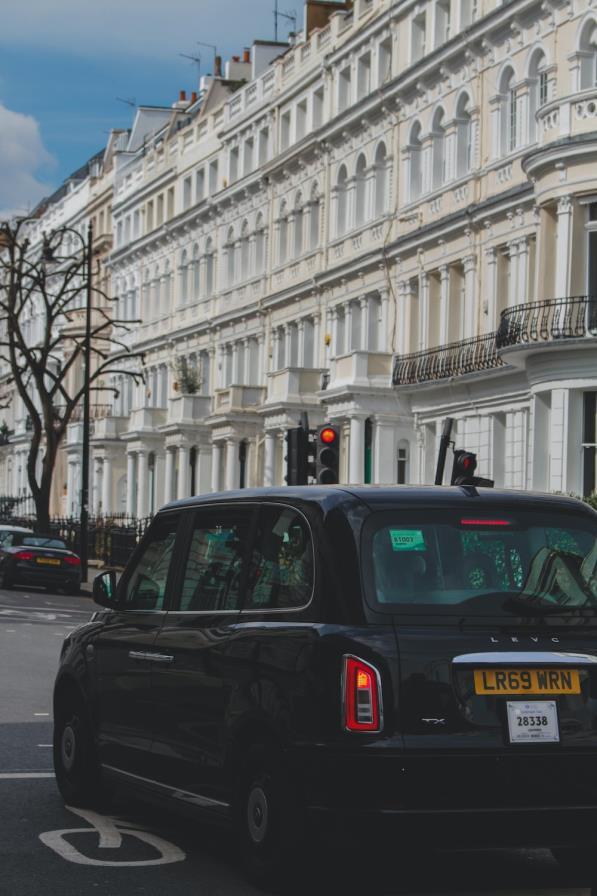
Private Hire and Uber drivers are not subject to these rates set by local authorities.
IF A DRIVER GOES JUST £1 OVER THE THRESHOLD HOW MUCH IN VAT WILL THE CABBIE HAVE TO PAY?

Turnover for considering the VAT registration requirement is calculated on a rolling twelve months. At the end of each month the business has to look back and see if they have exceeded the VAT registration limit for the past year. If they are over they must register for VAT within 30 days.
Once they are registered by HMRC VAT is due on all income not just the element above £85k.
HOW MUCH MORE WOULD THE DRIVER HAVE TO TURNOVER TO MAKE GOING PAST THE THRESHOLD WORTHWHILE?
This depends – if a driver takes £85,001 in a year and is then registered for VAT he will incur an annual VAT liability of approximately £14k on his income. However, he will be able to recover VAT paid on his fuel, car lease and repairs, so the net cost to the driver may be between £8k and £10k per year.
Disclaimer - Please be aware this article is for information purposes and does not constitute formal tax advice. Each individual’s circumstances are different, and they should contact a tax professional for specific advice.

6 | TAXIPOINT | MAY 2023 | EDITION 49 WWW.TAXI-POINT.CO.UK

BOOKINGS
MIXED RESULTS FOR INDUSTRY IN Q1 2023
Taxi Butler have released their Global Taxi Booking Industry Report for Quarter 1 2023. It features comprehensive data analysis into B2B taxi bookings throughout the last quarter, on a global and regional scale.
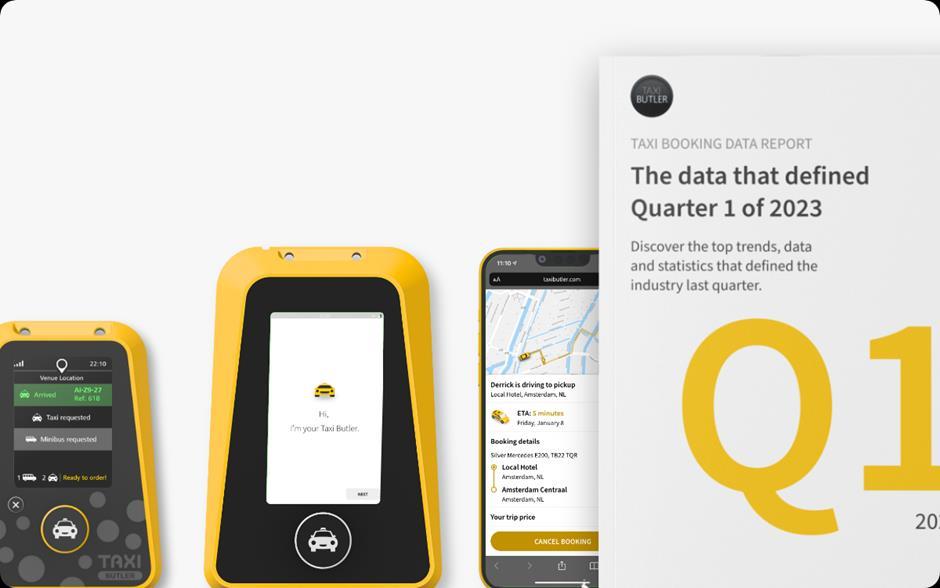

Some key highlights and takeaways include:
• A 2.6% average week-over-week growth in Q1 2023
• A 13.6% dip in bookings between Q4 2022 and Q1 2023.
Australia, New Zealand and North America are witnessing substantial growth, surpassing preCOVID levels, whilst the UK & Ireland and Europe haven’t recovered so quickly from the pandemic. Airports are becoming increasingly popular venues for taxi booking.
According to the report, Q1 2023 experienced a 13.6% decrease in bookings compared to Q4 2022
and fewer bookings compared to Q2 and Q3 2022. The report revealed an average of 19% lower monthly bookings every month than in 2019. However, March 2023 had 22% more bookings than January 2023, and 2.4% growth was noticed between January and March, with the most change occurring in March.
Laurence Docherty, Taxi Butler’s Sales Director, said: “Despite the decline in bookings compared to previous quarters, the taxi industry shows signs of growth on a more granular level with positive weekover-week growth, and some regions surpassing pre -COVID levels. Some regions are coming out of the pandemic stronger than others, which is to be expected.”
The report was written to provide insights, to support taxi business owners to better understand the global B2B taxi market and to drive them to make data-driven decisions.
8 | TAXIPOINT | MAY 2023 | EDITION 49 WWW.TAXI-POINT.CO.UK
GLOBAL TAXI
IMAGE CREDIT: TAXI BUTLER

SOCIAL MEDIA
A POWERFUL TAXI TOOL… IF USED CORRECTLY

Social media has become a powerful tool, for both good and bad, for the UK taxi industry in recent years. It has enabled taxi drivers and companies to connect with customers, promote their services, and respond to feedback. It has also created new challenges and opportunities for the industry, such as competition from ride-hailing apps, online reputation management, and customer loyalty.
One of the main benefits of social media for the UK taxi industry is that it can allow reach to a wider audience and attract new customers. By creating engaging content, such as videos, photos, stories, and testimonials, taxi drivers and companies can showcase their professionalism, reliability, and personality.

One of the huge social media successes in the industry can be seen via Tom Hutley's YouTube channel, Tom the Taxi Driver. Tom is a licensed London cabbie, a tour guide, an author, and a successful YouTuber with over 75,000 subscribers. He started his channel in 2020 and has since produced hundreds of videos showcasing his life as a taxi driver, his knowledge of London's history and culture, and his tips and tricks for aspiring cabbies. Used in the right way, social media can both highlight issues facing cabbies in a particular region and provide positive PR.
However, social media also poses some challenges and risks for the UK taxi industry. The biggest challenge of social media is that it requires cabbies with no media training to manage not only their own online reputation and image, but potentially the industry’s too. Since social media is a public platform where anyone can post or share anything, taxi drivers and companies have to be careful about what they say and do online.
10 | TAXIPOINT | MAY 2023 | EDITION 49 WWW.TAXI-POINT.CO.UK
Most brands avoid posting or engaging in anything that could damage their credibility or reputation, such as offensive or inappropriate content, false or misleading information, or spamming or trolling. The taxi industry should be no different. Whilst it’s only human and right that cabbies monitor what others are saying about the trade they represent online, it does require a united and professional response. It’s worth noting that an industry’s PR is sometimes only as strong as its weakest link.
TaxiPoint caught up with Tom Hutley to learn more about how he views digital marketing in the trade and whether argumentative interactions can ever return positive industry PR.
SHOULD MORE DRIVERS LOOK AT DIGITALLY MARKETING THEMSELVES AND THE TRADE? WHAT BENEFITS MIGHT THERE BE TO THE DRIVER?
Definitely. If you use social media, you already have a digital footprint that people can see and build a profile about who you are. Marketing yourself online is just an extension of that.
As more and more services become digital, so too is your presence and your trustability.

I would encourage drivers not to look at it as digital marketing, but another opportunity to build trust with your customers and audience. I have many people reaching out to book me specifically because they have grown to know and trust me! I helped a lady from across the pond who I had never met, but she had
watched enough of my videos to trust me to collect her children from the airport and help them move into university.
The benefits can extend much further than just work. It could be getting your name established in your local community. Promoting your personal interests outside of driving the taxi. As technology progresses, it will be the people without a strong digital presence who will lose out. It’s like asking around your group of friends “hey do you know of this person?” or “is this person trustworthy?” If you can’t find any information about that person, you’re likely to be sceptical if you can trust them.
CAN ANGRY OR ARGUMENTATIVE POSTING ON SOCIAL MEDIA EVER BARE POSITIVE PR OR RESULTS FOR THE TAXI INDUSTRY?

I get that there’s a lot of passionate drivers out there, but passion can be very easily misinterpreted as malicious comments. Especially in a short form medium that doesn’t allow for tone or context to be conveyed (i.e. Twitter).
I generally abide by the rule of “speak favourably of your competitors”. If you imagine the global titans of business, you would never hear Bezos slagging off Tesco’s. Ramsay putting down McDonalds. Or Branson going ape on Ryanair. The taxi trade is no different.
We have a lot of challenges that face the taxi industry in London. But rather than going all out with angry comments, we need drivers to unite, ensuring we deliver concise and professional messaging, that encourages policy makers to listen to us. Reputation takes years to build and can be lost in an instant. Each micro-interaction online could be another “cut” in the taxi trade. Death by a thousand cuts.
Take the time to construct your messaging, what is the point of your comment? Can it be interpreted negatively? How does this look to an outsider of the trade? Every comment is a chance to promote the trade rather than tear it down.
11 | TAXIPOINT | MAY 2023 | EDITION 49 WWW.TAXI-POINT.CO.UK
SIGNING UP IN THEIR DROVES’:
UNIFY LONDON APP
ATTRACTS OVER 1,000 TAXI DRIVERS ONTO ITS UNIQUE PLATFORM

Unify taxi app has recruited over 1,000 drivers onto its platform in just a matter of weeks as cabbies flock to support the unique hailing service.
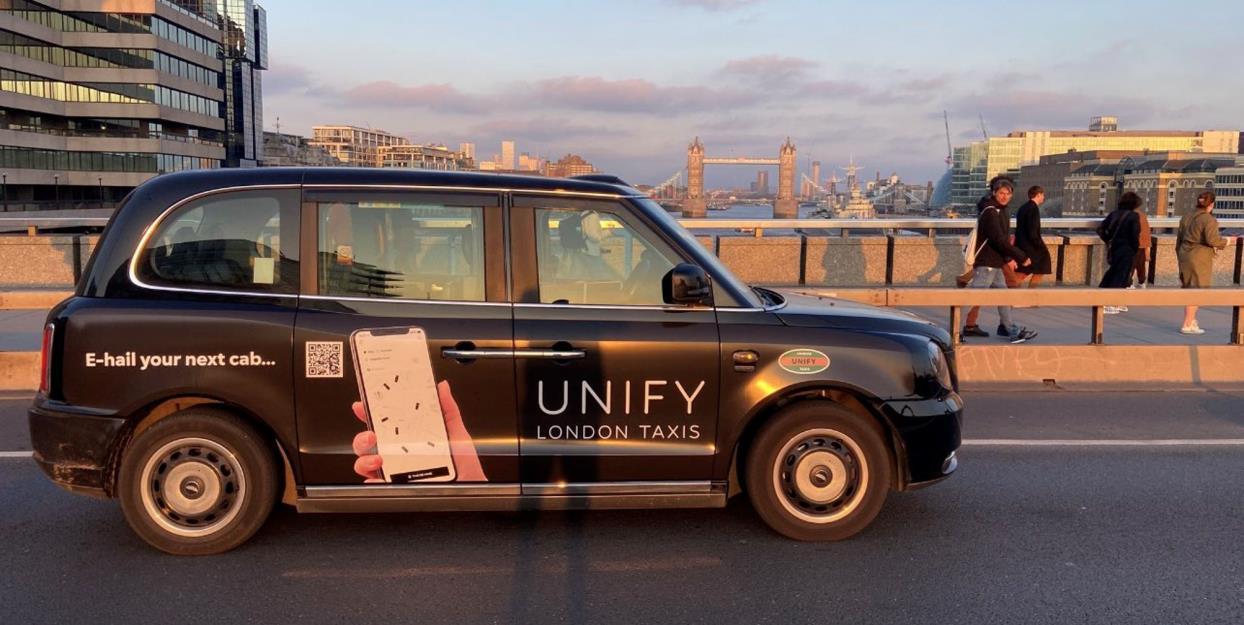
London cab driver and Taxi Charity volunteer Micky Harris used an unexpected legacy from his late wife Barbara to create the Unify London App.
Barbara regularly joined Micky on Taxi Charity trips to the continent before her death and she left
instructions that Micky was to use the legacy to support the cab trade and help charities run by taxi drivers.
The Unify London App is different to anything else that is currently available to London cab drivers. There is no surge pricing, no hidden fees, no cancellations, hired from the hail, light off-meter on and unlike other Apps, the Unify London App will
12 | TAXIPOINT | MAY 2023 | EDITION 49 WWW.TAXI-POINT.CO.UK ‘
IMAGE CREDIT: UNIFY LONDON APP
give cab drivers the full metered fare. In addition, charities including the Taxi Charity for Military Veterans, The London Taxi Drivers’ Charity for Children, The Albany Taxi Charity and the Magical Taxi Tour will benefit every time the app is used.

TaxiPoint asked Micky what the feedback from drivers had been like since launching in April. Micky said: “The comments and feedback from drivers are amazing. The amount of heartfelt warmth and comments from them has certainly reassured me that I am doing the right thing.

“They are signing up in their droves and we have over a thousand drivers registered with us already in such a short time. Hundreds more have downloaded the app but are yet to complete their details. I would urge them to do so quickly before the rush comes from all the publicity we are gaining.
“There has been a buzz associated with this new style app and we are very proud of the drivers for getting behind us so quickly and enthusiastically. It has been truly inspiring, and under the circumstances, very emotional for me too.“
There have been many taxi hailing apps that have come to market, but then go on to stutter due to the lack of a unique selling point when compared to what’s already on the market. Unify does however seem to be unique and has tapped into the hearts of many already given its origin and links to good causes.
This app will remain guarded by our family for generations to come. There is no amount of money that would make us part with Barbara’s legacy to the trade. End of.”
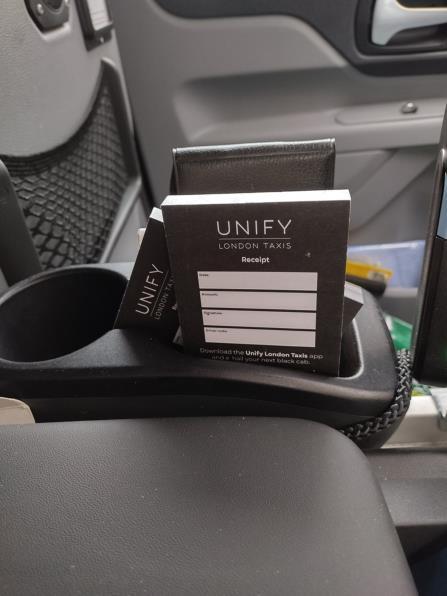
13 | TAXIPOINT | MAY 2023 | EDITION 49 WWW.TAXI-POINT.CO.UK
IMAGE CREDIT: UNIFY LONDON APP
HOW ARE UNIFY GOING TO RECRUIT PASSENGERS?
This has always been the hard bit, or otherwise known as the expensive bit. App users have come to expect subsidies on rides when joining mobility apps and unless you’ve got deep pockets it’s difficult to not only recruit passengers, but also retain them in a bloated market.
If a customer goes on to share the App information, with their family, friends, and colleagues, these new customers will also be linked to that driver.
Provided the driver’s badge number is entered upon sign-up. This can be made easy by using the advertising materials within the taxi, upon which the driver has clearly written their badge number.

Drivers should encourage
different angle. The links to established and well supported charities aims to recruit via an emotional sale. Passengers will feel empowered helping good causes whilst also getting the service they require.
The Unify ‘Customer Tree’ model also incentivises taxi drivers to recruit passengers to the platform for long-term reward. Here’s how it works:
When a customer signs up, adding a driver’s badge number, they are linked together with that driver for as long as both remain active on the app. Every time the customer uses the app, 10 pence will be allocated to the driver’s reward box, regardless of who the customer rides with.
material (including their badge number) and share it via social media. The driver then receives 10 pence, every time these customers use the app too.
Providing they have entered the driver’s badge number upon sign up, these trees can grow to any size and are not restricted in any way.
Customers that sign up without a driver number, are linked to Unify’s charity account reward box instead. This allocation of company profits has been designed with the wider taxi community in mind.
Unify has a clear recruitment plan set in place and you know what it might just work.
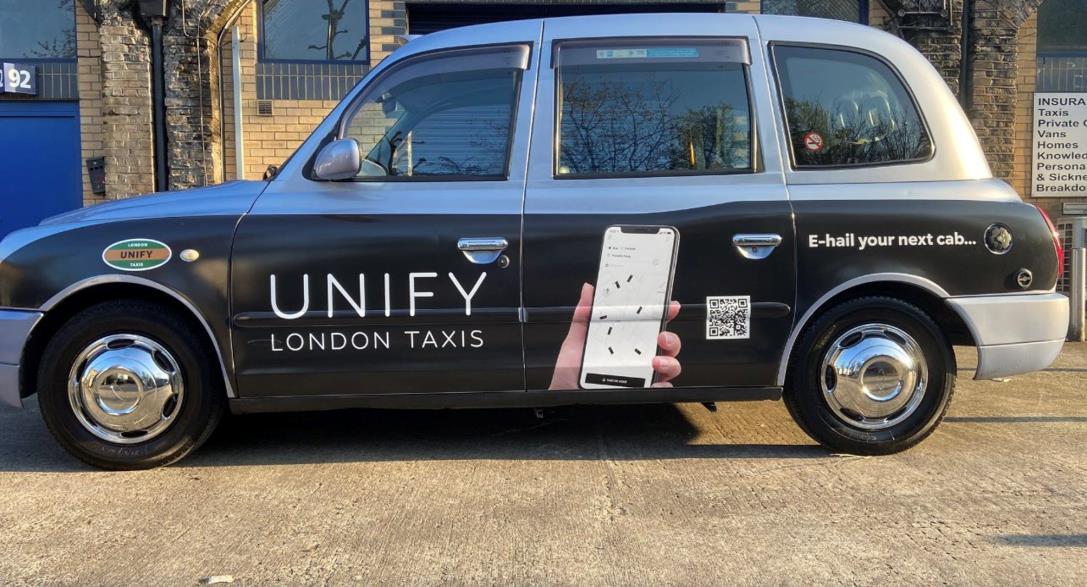
14 | TAXIPOINT | MAY 2023 | EDITION 49 WWW.TAXI-POINT.CO.UK
APP
IMAGE CREDIT: UNIFY LONDON

A CITY’S IDENTITY: LONDON TAXIS CELEBRATE 200TH ANNIVERSARY

The London taxi, a symbol of the city's history and culture, celebrates its 200th anniversary this year.
London's black cabs are one of the most iconic symbols of the city, along with the red phone boxes and the double decker buses. But how did they come to be, and what is their history?
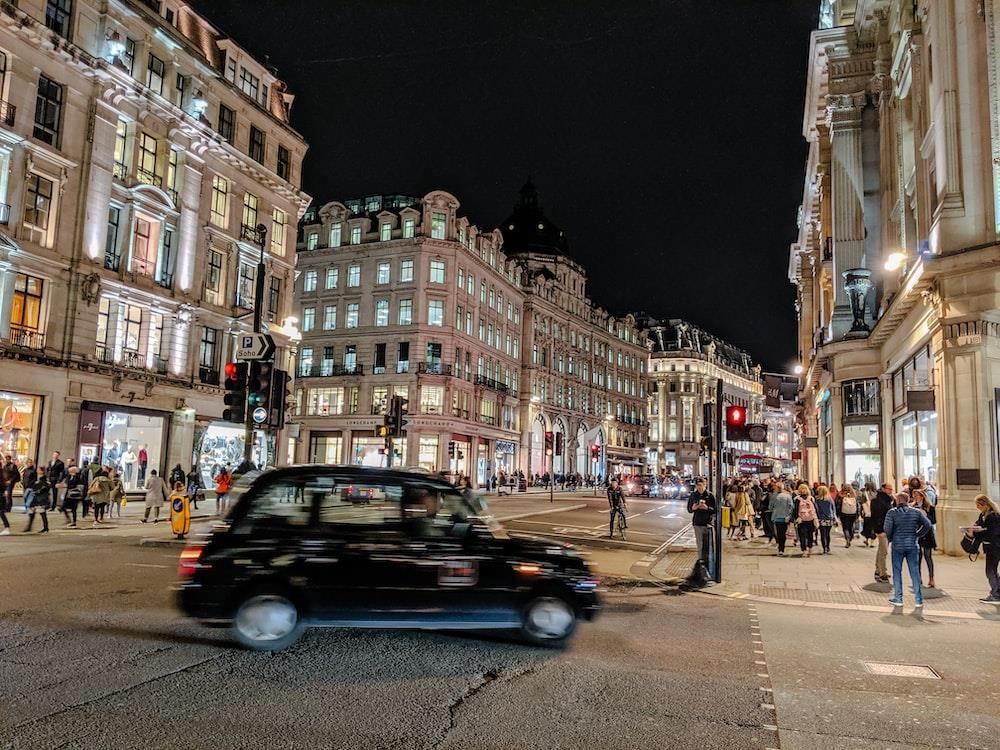
Way before the first licensed hackney cab in London were the horse-drawn coaches that appeared in Tudor times, when wealthy citizens would rent out their carriages to earn some money. The first licensed London taxi appeared on the streets in 1823. By the mid-1800’s there were thousands of hackney coaches on the streets of London, charging an average price of 8 shillings for a ride.
The hackney coaches then faced competition from new types of carriages that arrived from France: the cabriolets. These were lighter, faster and cheaper
than the hackney coaches, and gave rise to the modern word 'cab'. Another popular model was the Hansom cab, which had two wheels and a driver standing in the back. The Hansom cab was elegant and agile, but also prone to accidents. A fourwheeled carriage called the Clarence, or 'the growler', was more suitable for carrying luggage and larger groups of passengers.
The advent of the automobile industry brought a revolution to the cab business in the 20th century. The first electric cabs appeared in London in 1897, but they were soon withdrawn due to technical errors and road accidents. Petrol cabs took over instead, and by 1908, the first motorised cabs were licensed in London. These cabs had to meet certain standards of design and performance, such as having a turning circle of 25 feet (7.6 metres), which is still required today.
16 | TAXIPOINT | MAY 2023 | EDITION 49 WWW.TAXI-POINT.CO.UK
LONDON TAXI 200TH ANNIVERSARY
The meters that measure the fare based on distance and time were introduced in 1907, after a long dispute between cab drivers and authorities over how to regulate prices. The meters were initially mechanical, but later became electronic. The fare system has changed over time, with different tariffs for different times of day in operation.
The most iconic model of London's black cabs is the Austin FX4, which was introduced in 1958 and became the standard for
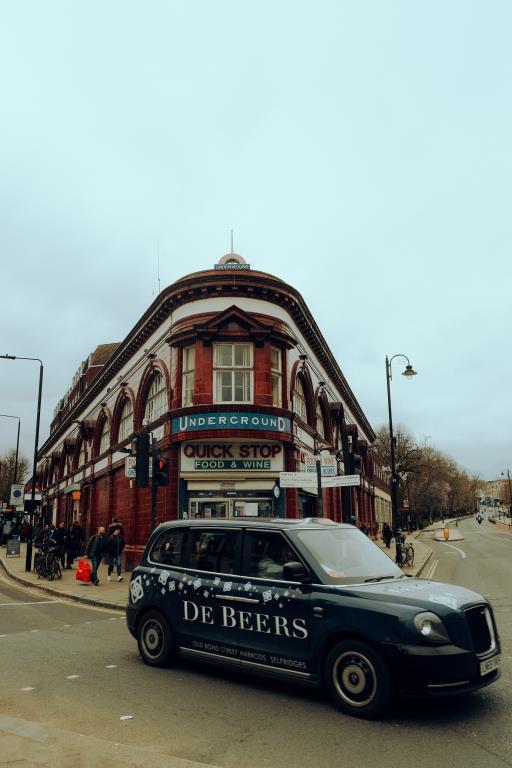

almost 30 years. It had a distinctive shape and colour, and could seat up to five passengers. The FX4 was replaced by the TX series in 1997, which had more modern features such as air conditioning and wheelchair access. The latest model is the TX5, which is electric and hybrid, and aims to reduce emissions and noise pollution.
London's black cabs are more than just vehicles; they are a city’s identity on wheels.

17 | TAXIPOINT | MAY 2023 | EDITION 49 WWW.TAXI-POINT.CO.UK
LONDON TAXI 200TH ANNIVERSARY
THE SAFETY NET OF MOBILITY’
HOW HAS THE GLOBAL TAXI INDUSTRY BEEN IMPACTED BY DIGITALISATION, DECARBONISATION, CLIMATE CHANGE AND THE CORONAVIRUS PANDEMIC?
If public transport is the backbone of urban mobility, then taxis and ride-hailing services are its safety net, providing fast, reliable, 24hour service. But what is the current state of those players in 2023?

The latest UITP Statistics Brief: “Global Taxi Hailing Benchmarking Study 2019provides a detailed picture of those services in different cities across the globe. This expert data shows a general pattern of what happened during COVID-19, and during a time when energy prices sky-rocketed as the climate emergency became much more
WHAT WERE THE FINDINGS?
19 had a huge impact on the Taxi and Hailing market, with the numbers of riders dropping by 74% in 2020 in Chicago, 56% in Casablanca, 59% in San Francisco and 39% in Dubai. As of the end of 2021, all four cities had not recovered to previous levels of ridership, registering an average of 84% of
Clean’ vehicles increased. Out of the cities which provided data, cleaner taxi vehicles increased by 15%, while

petrol and diesel decreased by 24%. Battery electric vehicles (BEVs) have increased by 66% over the last three years, but still only represents less than 1% of the total fleet.
Local public authorities, even when they cannot regulate taxi and ride-hailing services, can contract their vehicles for specific services to support the local public transport system. These include transport for people with reduced mobility (frequently known as ‘paratransit services’) or to complement a Demand-Responsive Transport (DRT) scheme.
The UITP also highlighted that from the data collection there was the clear lack of available data on these services despite the progressive digitalisation of the sector. Out of all the cities which participated in the research, none of them have an overview of the total number of requests for taxi and ride-hailing services.
Lidia Signor, UITP Combined Mobility Manager, said: “Local public authorities are called to step up their competence over taxi and ride-hailing services and overcome the observable lack of available data in order to shape a more integrated, inclusive and sustainable mobility system.”
18 | TAXIPOINT | MAY 2023 | EDITION 49 WWW.TAXI-POINT.CO.UK
‘

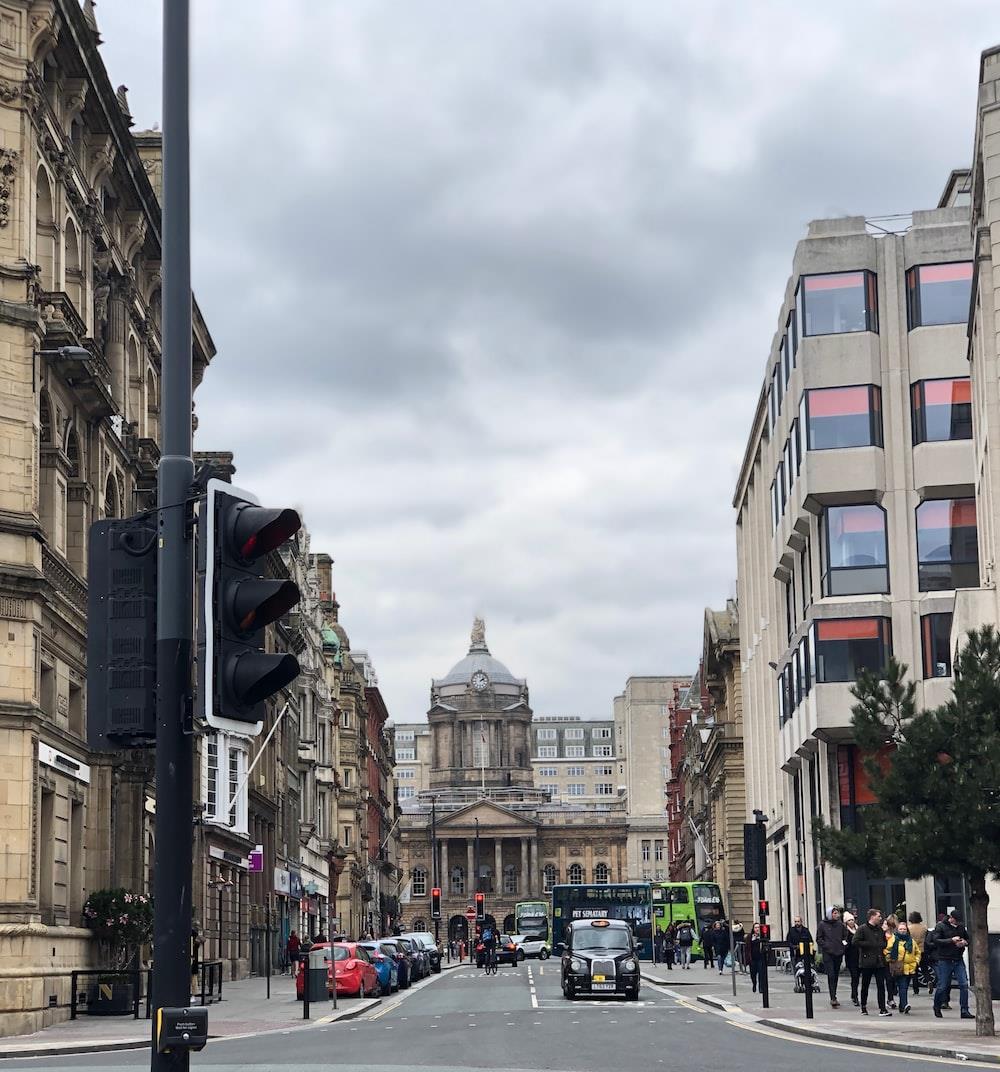
year's earnings for a lot of drivers. And with the broader move towards electric vehicles, the costs are even higher. The average EV costs around £50k.
WHY ONLY TEN YEARS?
The MLS scheme states that vehicles should be less than ten years old for several reasons:
Environmental Impact: Newer vehicles typically have lower emissions and are more environmentally friendly than older models.
Safety Standards: Newer vehicles generally come equipped with more advanced safety features, such as improved braking systems, airbags, and electronic stability control.
Vehicle Reliability: Older vehicles are more likely to experience mechanical issues and breakdowns.
Public Perception: Newer vehicles can create a better public image for the taxi and private hire sector, as they are often seen as cleaner, safer, and more comfortable.

PROPOSED ALTERNATIVES
Striking the right balance between public safety, environmental impact, and drivers' financial burden is crucial for the successful implementation of the MLS scheme. A solution that addresses these concerns while still achieving Greater Manchester's environmental goals is necessary to ensure the taxi and private hire industry's long-term sustainability.
Cllr Haworth suggested that the minimum vehicle age be raised to 15 years, to mitigate the financial impact on drivers. Whilst this may not be a perfect solution, the extra 5-years would be a useful buffer whilst the trade is still recovering. Limiting the financial burden on drivers also ensures that they can continue to operate an affordable public service.
CONCERNS OVER CROSS-BORDER LICENSING
While support for the MLS scheme is quite strong, there are fears that their introduction could lead to drivers going elsewhere for their licences.

Cllr Paul Heslop, raised this concern at a recent debate: “I have got one word to say on this issue and that is Wolverhampton.
“I feel personally if minimum licensing standards goes through in Greater Manchester the number from Wolverhampton will go higher and higher.”

It was recently reported that 4,049 licences issued by Wolverhampton Council belong to drivers who were registered at the time of their application as being in Greater Manchester.
Councillors are concerned at potential safety concerns due to differences in licensing conditions between the two areas. In the past, Wolverhampton council have

21 | TAXIPOINT | MAY 2023 | EDITION 49 WWW.TAXI-POINT.CO.UK
been accused of offering down’ licensing. Something they strongly reject.
Cllr Steve Evans, City of Wolverhampton Council member for city environment and climate change, insisted they had high standards:
Wolverhampton Council has invested heavily in digital technology which enables us to thoroughly check driver and vehicle details.
“We have a high level of licensing standards and are believed to be the first in the country to have introduced daily enhanced DBS checks on all of our drivers.
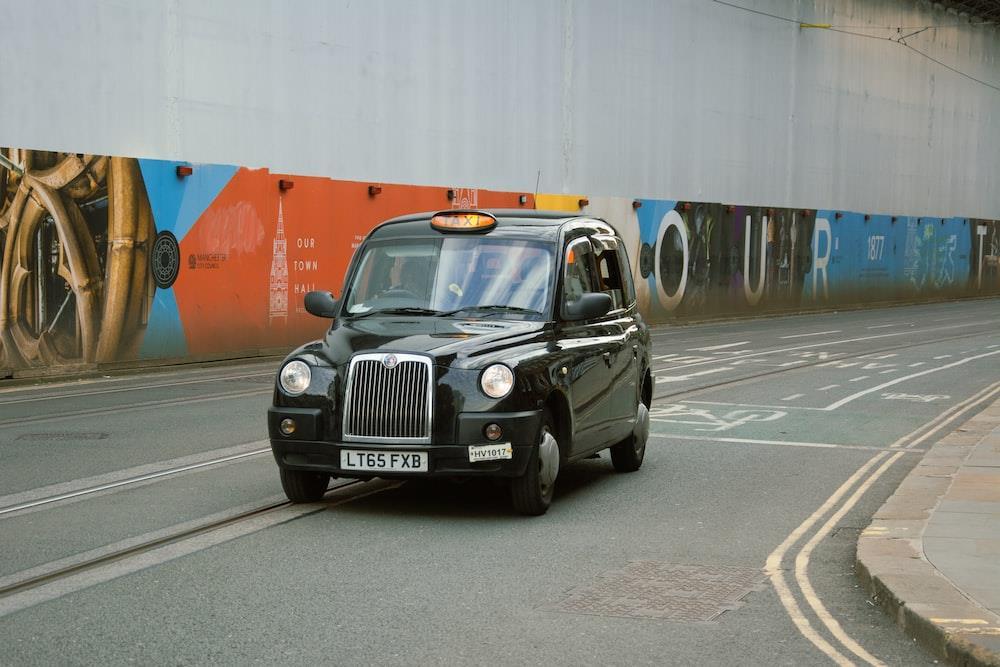
“We have also introduced technology that checks applicants right to work, similar to the systems

22 | TAXIPOINT | MAY 2023 | EDITION 49
DIESEL RIP-OFF: DIESEL WHOLESALE PRICES FALL BELOW COST OF PETROL BUT PUMP PRICE REMAINS 16P MORE
The price of diesel fell by nearly 4p a litre in April but still remains at least 16p more expensive than it should be as it’s now 6p cheaper than petrol on the wholesale market, according to data from RAC Fuel Watch.
A litre of diesel closed the month costing drivers an average of 159.43p across UK forecourts while petrol was unchanged at 146.5p.
This is the sixth month that the average pump price of diesel has fallen, but despite this the RAC knows drivers are losing out because the wholesale price of the fuel was cheaper than petrol for all of April. A litre of wholesale diesel cost 104.88p on 28 April – down 9p in the month – whereas unleaded was 111.25p (down 6p in April). However, apart from in Northern Ireland where diesel averages 147.47p, diesel in the rest of the UK is still 13p more expensive on the forecourt. The RAC believes

PRICES
drivers should really be paying around 143p at the very most for a litre of diesel.
The cost of filling a 55-litre family car with petrol now stands at £80.60. The diesel equivalent is £87.69. If diesel was being sold at the fairer price of 143p it would save drivers a staggering £9 a tank.

At the end of April the average price of unleaded at one of the big four supermarkets was 142.99p –3.5p cheaper than the UK average. Diesel was 2.75p cheaper than the average at 156.68p – down 3p since the start of the month.
RAC fuel spokesman Simon Williams said: “Diesel drivers across the UK mainland continue to lose out badly at the pumps. They’re paying 13p a litre more for the fuel than petrol, despite diesel being cheaper for retailers to buy on the wholesale market for all of April.
“This just isn’t fair for the country’s 12m diesel car drivers. We feel there should be an obligation on retailers to reflect wholesale price movements on their forecourts. Sadly, the only place this seems to happen is in Northern Ireland where a litre of diesel is, incredibly, being sold for 12p less than the UKwide average.”
THIS MONTH ’ S
NEW LAW
DATABASE ACROSS ALL LOCAL AUTHORITIES
New measures will safeguard passengers and crack down on unfit taxi and private hire vehicle drivers, with tighter checks introduced across Local Authorities.


Building on existing legislation, councils in England will now be mandated to use a national database to record instances where taxi and private hire vehicle drivers have their licences removed for misconduct. This new law will prevent them from simply reapplying for a licence in other areas by alerting the system to concerns about their prior behaviour.
This will ensure passengers can use taxis and private hire vehicles with greater confidence that these modes of transport are safe, helping to strengthen communities and restore pride in towns and high streets across the country.
While the vast majority of taxi and private hire trips are safe and efficient, there have been a small number of reports linking a minority of drivers to incidents of sexual harassment, abuse, and poor driving.
Transport Secretary Mark Harper said: “The safety of passengers, especially women and girls, is paramount. That’s why I’m bringing in tough new measures to ensure that when you catch a cab, you can be confident your driver will take you from A to B safely and without incident.
“While the vast majority of drivers are hardworking and honest, we’re taking steps to remove the few who abuse their position and pose a risk to passengers.”
24 | TAXIPOINT | MAY 2023 | EDITION 49 WWW.TAXI-POINT.CO.UK
ENGLAND NEWS
The step will bring into full force the Taxis and Private Hire Vehicles (Safety and Road Safety) Act 2022 and is being backed by the family of Sian O’Callaghan, who was tragically murdered by a private hire vehicle driver in Swindon in 2011, aged 22. Her family have since been campaigning for tougher measures to protect passengers.
Sian's family said: “To see this law being implemented and rolled out today across all local authorities is testament to Sian, it was in her nature to help others and this means so much to us personally.
“Her name is now linked to a drastic improvement in passengers’ safety within taxis and PHVs, whilst also better protecting hard-working, law-abiding drivers themselves.”
The Act, introduced last year, was spearheaded by Darlington MP Peter Gibson and has been supported by Ms O’Callaghan’s family and the personal safety charity, Suzy Lamplugh Trust.

Suky Bhaker, CEO, Suzy Lamplugh Trust, said: “We welcome today’s announcement of tighter checks on drivers as an important milestone in steps to achieve this. It is vital that licensing authorities have access to all relevant information to decide if a driver meets licensing safety requirements.”
The existing database is already used voluntarily by some local authorities, but only 74 percent of councils in England are using it.
From 27 April, use of the database is compulsory for every driver licence application and the Department for Transport will monitor its use closely. Councils that fail to do the necessary checks could face legal action.
Hosted by the National Anti-Fraud Network, the system records all instances where taxi and private hire vehicle driver licences have been refused, suspended or revoked on either safeguarding or road safety grounds.

Improving information-sharing between licensing authorities prevents drivers who could do harm
from getting a licence elsewhere without being challenged.
Steve Wright MBE, Chair of the Licensed Private Hire Car Association, said: join up enforcement and compliance nationally between licensing authorities to prevent the unacceptable movement from one authority to another of those who are unfit to be in the sector."
The benefits of the database are already clear to licensing authorities using the system. In Luton, the platform revealed an applicant who previously had their licence removed due to safeguarding concerns. Despite the driver failing to disclose this in their application, the system ensured the licensing authority was aware, and the request was rejected as a result.
Elsewhere, the database prevented a driver who had previously assaulted another taxi driver in Southampton from regaining a licence in Winchester.
The announcement forms part of the Government's commitment to support survivors and prioritise, prevent, and strengthen the pursuit of those who abuse their position of trust. Alongside the new Grooming Gangs Taskforce to tackle child sexual abuse and exploitation, this measure will weed out unfit drivers and safeguard passengers who rely on these services.
25 | TAXIPOINT | MAY 2023 | EDITION 49 WWW.TAXI-POINT.CO.UK
BARONESS VERE AND LORD BORWICK WITH REPRESENTATIVES FROM THE SUZY LAMPLUGH TRUST, ELAINE PICKFORD AND LIAM O’CALLAGHAN AND MR GIBSON.
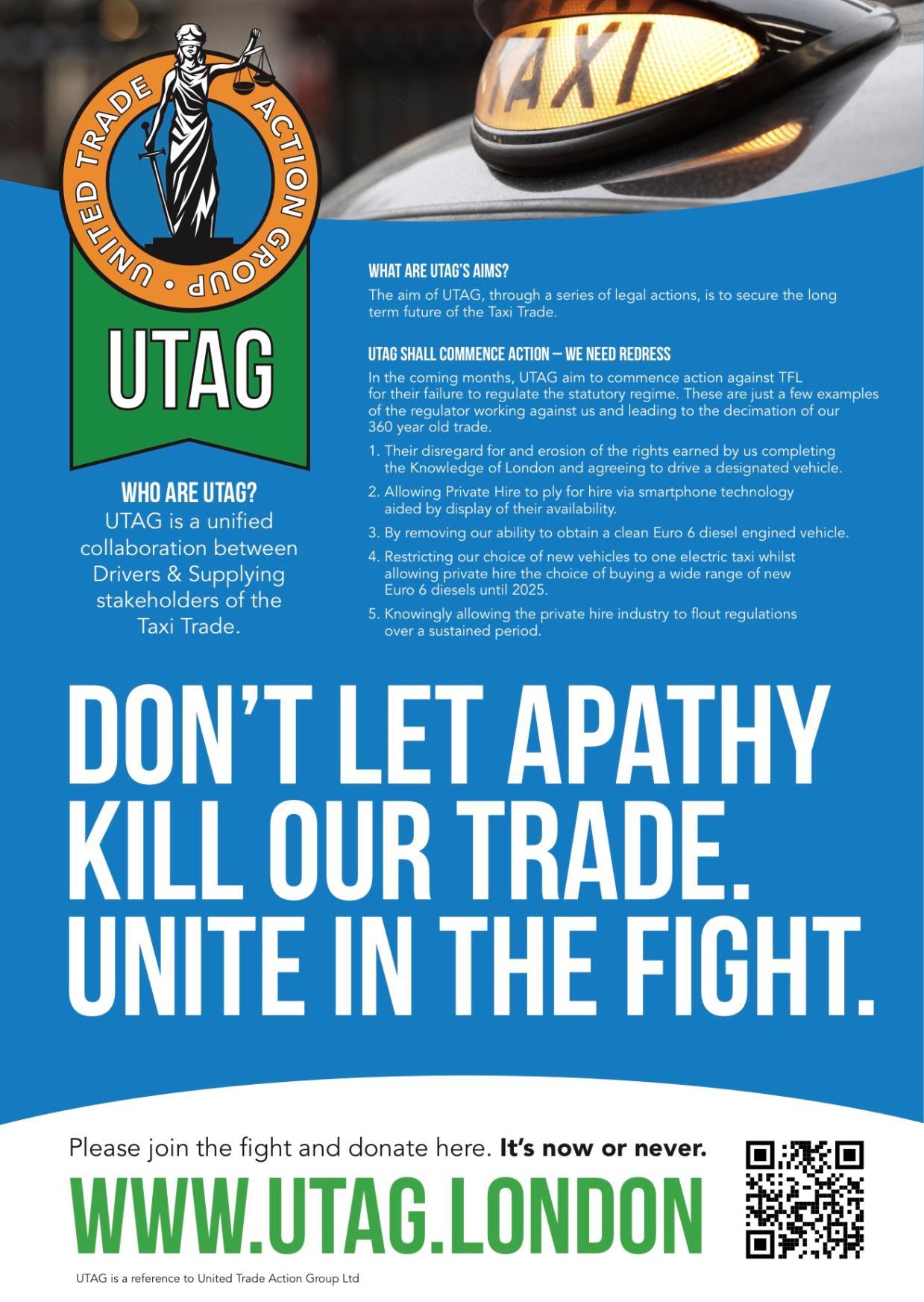
MP LAUNCHES BILL TO GRANT NEW POWERS TO STOP EXPANSION OF LONDON ULEZ AND OTHER ‘ANTI POLICIES
Theresa Villiers, a former Cabinet minister and current Member of Parliament for Chipping Barnet, has made a bold move to challenge London Mayor Sadiq Khan's 'anti-car policies'.
She introduced a Ten-Minute Rule Bill to the House of Commons, seeking to grant the Government new powers to scrap the expansion of the capital's Ultra Low Emission Zone (ULEZ).
The Bill aims to amend the 1999 Greater London Authority Act, so that the Transport Secretary, Mark Harper, can have the authority to review and overturn decisions made by the London Mayor on matters related to transport and air quality. This would include the expansion of ULEZ, and other controversial policies being pursued by Khan, such as the growth of Low Traffic Neighbourhoods (LTNs) and lowering speeds to 20mph on main roads.

Ms Villiers has been a vocal critic of the London Mayor's policies, which
she says have caused undue hardship and inconvenience to residents who rely on their cars. Her proposed legislation would give more power to the national government, and ultimately, provide a more balanced approach to tackling air pollution and improving transport in the capital.
It remains to be seen whether Ms Villiers' Bill will gain enough support in the House of Commons, but her efforts have certainly opened up a new front in the ongoing debate over transport policy in London.
Theresa Villiers MP said in full at the House of Commons: given to bring in a Bill to amend the Greater London Authority Act 1999 to give the Secretary of State power to review and overturn decisions made by the Mayor of London relating to transport and to air quality; and for connected purposes.
“
In my 18 years as MP for Chipping Barnet long
such strong opposition as the Mayor
27 | TAXIPOINT | MAY 2023 | EDITION 49
of London’s plan to expand the ultra low emission zone. It comes up on almost every doorstep and at almost every meeting. People stop me in the street to tell me how strongly they feel about it, and over 50,000 have signed the Conservative petition. That is why I am bringing forward a Bill to give the Government power to overrule Mayor Khan and stop ULEZ expansion.
”Of course, we need to continue to improve air quality in London, but this is the wrong scheme at the wrong time. The Mayor’s own integrated impact assessment concluded that ULEZ expansion is likely to have only a minor or negligible beneficial impact on air pollution, so it is completely unacceptable for a £12.50 a day charge to be levied on my constituents who are already grappling with the worst cost of living pressures for many years.
“ULEZ has been tolerated in inner London because it has one of the most extensive public transport systems in the world. That is just not the case in the suburbs. In Barnet, and in other outer London boroughs, many of us depend on our cars for millions of journeys every year. For many of us, the nearest train or tube station is well beyond walking distance. The claim that the Mayor’s new orbital bus route, which, I would add, barely makes it into my constituency, can provide a viable alternative to suburban car travel is simply risible. The Mayor has already withdrawn vital bus services such as the 384 from certain streets and he is doing nothing to restore the cancelled 84 route. The reality is that ULEZ expansion to the Greater London boundary leaves my constituents facing the cost of buying a new vehicle, which many cannot afford, or paying an annual bill that could reach as much as £4,500 a year just to get about their own neighbourhood.
“The scheme could devastate our local town centres in outer London as their regular customers stop coming because of the paywall
that Mayor Khan is constructing around our capital. Small businesses will be hit hard. Many are already struggling to find compliant vans that are affordable. The Mayor’s grace periods, exemptions and scrappage scheme are narrowly drawn and frankly barely touch the sides of tackling the problem. Even those who do qualify find that the payments do not meet anything like the whole cost of a new vehicle.
“Let us take the example of an emergency worker doing a night shift: they face the double whammy of a charge to travel to work and another after midnight to return home, meaning £25 just to do a shift. ULEZ expansion will mean that public services in outer London, especially the care sector, find it even harder to hire the staff they need, since so many of the current workforce live outside London and drive in.
“Driver and Vehicle Licensing Agency data indicates that there are over 690,000 noncompliant cars registered in London. That rises to over 850,000 when we count all vehicle types. The number will be higher still when we take into account people whose work or daily life means they need to come into London from neighbouring counties. And of course, they have no vote in a mayoral election taxation without representation in a particularly blatant form.
“Along with my constituents, residents across the London suburbs and bordering counties will be paying the price for Sadiq Khan’s wholesale mismanagement of Transport for London’s finances. He has been given a £6 billion bail-out by the Government and yet still, even with that, he wants to squeeze people for more charges and more fines, cynically disguised as air quality measures. We in this House have to be aware that if the Mayor is allowed to push this scheme through, it is only a matter of time before he hikes up the daily charge and imposes it on an ever wider range of vehicles as a stepping stone to the

28 | TAXIPOINT | MAY 2023 | EDITION 49 WWW.TAXI-POINT.CO.UK
pay-per-mile road charging he would like to inflict on every single driver in London. That is why we need to stop ULEZ expansion now.
“But ULEZ is not the only scheme that the Bill could give Ministers the power to review and potentially overturn: there are also streets shut off by low traffic neighbourhoods; road space lost to poorly designed and wrongly sited cycle lanes; inexplicable and seemingly pointless pavement extensions; and 20 mph limits on wide main roads. A range of policies are now being pursued that are manifestly and disproportionately anticar. Some are led by the boroughs, but they all have the enthusiastic backing of the Mayor and many are funded by TfL.
“Schemes of this kind can be appropriate in the right setting and following meaningful consultation, but the Mayor of London just seems intent on making our capital city harder to get around. It feels like parts of London are being turned into a hostile environment for cars, vans and taxis. That damages productivity, prosperity and quality of life.
“I support measures to make cycling easier and safer, but why remove swathes of road space in Park Lane for a segregated cycle lane when there is already a far more pleasant cycle lane through Hyde Park right next to the road? And why did it take two years of massive congestion on Euston Road for the Mayor to accept that his cycle lane there was a disaster and remove it? Why ban licensed taxis from Bishopsgate, one of our most important transport arteries since the Roman era? There seems to be no logic in the imposition of the 20 mph limits on major arterial routes such as Finchley Road and Park Lane, unless it is to soak drivers for the 1 million speeding fines that the Mayor is urging the police to issue. Add to that the Mayor of London’s attempt to build over station car parks and his increasing pressure in the planning system for so-called car-free developments to be built, and we have what looks
like an ideological anti-car approach. Of course, there is merit in schemes that support a switch to cycling, walking and public transport, but the focus should be on improving services, not piling on new charges or arbitrarily removing chunks of our road network capacity.
“There are also serious equality concerns. For many who are elderly or those who have reduced mobility, such as parents with young children, cycling may not be a practical option. The concerted push to restrict car and taxi access to road space harms those groups and can also have a negative impact on women’s safety, because they force more women to walk home after dark.
“In conclusion, I find it hard to believe that I have to restate this, but the car is a force for good in the world. Huge progress has been made in recent years in improving road safety and reducing emissions. Without cars, vans, lorries and taxis, our transport system would grind to a halt and our economy and our society would be paralysed. Cars help us live our lives in the way we want to. They keep us connected to friends and family. They make possible so much of what we enjoy; so much of what makes life worth living would be difficult or impossible without the freedom that driving allows us.
“It is time for a reset. It is time to lift the stigma increasingly attached to driving. It is time to scrap anti-car ideology. It is most definitely time to stop ULEZ expansion and elect a Conservative Mayor of London.”


29 | TAXIPOINT | MAY 2023 | EDITION 49 WWW.TAXI-POINT.CO.UK
GDPR: TFL ARE ‘AWARE’ OF DUTCH SUPREME COURT JUDGMENT AGAINST UBER AND ARE ‘CONSIDERING THE DETAIL’
Transport for London (TfL) are ‘aware’ of an important Dutch Supreme Court judgment made against Uber and Ola, and are currently ‘considering the detail of the ruling’.
The comments come as a black cab action group released an open letter recently accusing TfL of a ‘failure to properly regulate’ and called for fresh ‘sanctions’ against minicab operators Uber.

The letter from United Trade Action Group (UTAG) is centred around the digital rights ruling where the Court of Appeals in Amsterdam found in favour of workers and against Uber and Ola Cabs.
Earlier this month, Worker Info Exchange (WIE) brought the cases in support of members of the App Drivers & Couriers Union (ADCU) in Great Britain and a driver based in Portugal.
The cases were brought under the GDPR which guarantees everyone the right to demand access to their personal data processed by any organisation and to receive meaningful information about the
processing of such data. In addition, the GDPR gives everyone certain protections from automated decision making where there are significant negative consequences.
A TfL spokesperson told TaxiPoint: “We are aware of the judgement from the Amsterdam Court of Appeal and are considering the detail of the ruling.”
An Uber spokesperson said: “Uber is still carefully studying these rulings and in due course will decide whether to appeal to the Dutch Supreme Court.
“We are disappointed that the court did not recognise the robust processes we have in place, including meaningful human review, when making a decision to deactivate a driver’s account due to suspected fraud.
“Uber maintains the position that these decisions were based on human review and not on automated decision making, which was acknowledged earlier by the previous court.
IMAGE CREDIT: LEVC
“These rulings only relate to a few specific drivers from the UK that were deactivated in the period between 2018 and 2020 in relation to very specific circumstances.”

UTAG however argue that the global operator should face fresh ‘sanctions’ following the decision and recent data breaches.
A UTAG spokesperson said: “This assertion about Uber from (Sadiq) Khan was in Oct 15. "One strike and you are out"
“Since then ULL (Uber London Limited) has had 6 chances and are now guilty of another huge data breach.
“
Will the Mayor now act as he promised 8 years ago? Only UTAG will hold him to account and continue the fight.”
In the UTAG letter, signed by Directors
Angela Clarkson and Trevor Merralls, it says:
“Following the judgements in Amsterdam’s Court of Appeal in the “Robo-Firing Case” it is patently clear that Transport for London are, yet again, failing to properly and robustly regulate Uber London Limited.”
The letter goes on to add: “Transport for London will be aware that Uber has a number of conditions attached to their current licence. One such condition relates to the reporting of breaches.”


WWW.TAXI-POINT.CO.UK
‘CAREFULLY CONSIDERED’: MAYOR REMAINS TIGHT LIPPED AT THE PROSPECT OF FULL TAXI ACCESS ACROSS LONDON
The Mayor of London remained tight lipped at the possibility of full black cab access across the capital’s road traffic schemes saying each restriction was ‘carefully considered’.
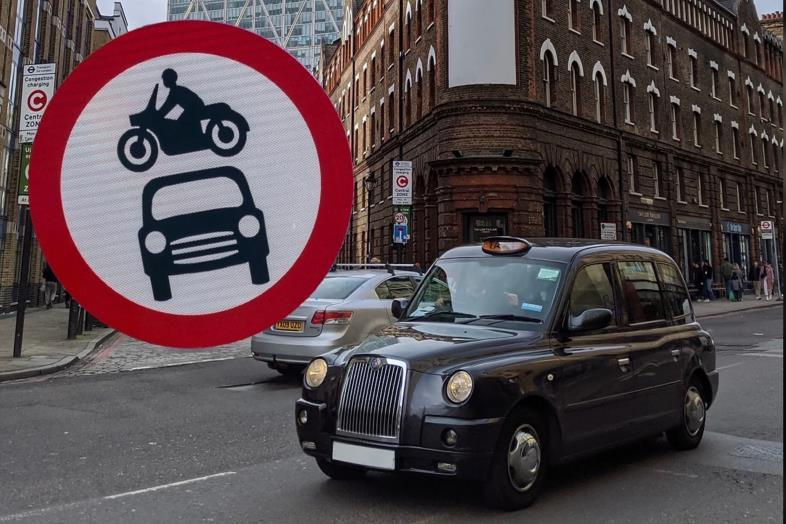
Bus gates and Low Traffic Neighbourhoods (LTNs) have long been a controversial talking point in the taxi industry forcing many cabbies to give up servicing areas of the capital.
In a short survey conducted by TaxiPoint in 2021, 82% of cabbies said they steered clear of LTN restrictions for fear of being fined or getting stuck in heavy traffic in the complex new networks.

Assembly Member Caroline Pidgeon highlighted to the Mayor that some London boroughs have permitted taxis access to their traffic schemes with no adverse effects. The inclusion of black cabs have improved accessibility whilst maintaining the benefits of the schemes.
Pidgeon asked the Mayor whether he would work with London Councils and TfL to allow London’s taxis access to all streets and roads.
Sadiq Khan, the Mayor of London, said: “The design of each traffic scheme needs to take account of the specific infrastructure features, people movements and traffic demand in a particular location. All
aspects of road user access, including taxi access, are carefully considered in the context of the outcomes intended for each scheme.
“In delivering schemes, Transport for London (TfL) complies with the Public Sector Equality Duty, and Equality Impact Assessments are undertaken and meaningfully taken into account for schemes as appropriate.
“
Where funding is allocated to boroughs for delivery, published guidance sets out requirements for projects, including highlighting boroughs’ own duty to comply with the Equality Act 2010. These statutory responsibilities rest with the boroughs on their projects, but TfL continues to work with partners to share updated best practice and guidance where applicable.”
32 | TAXIPOINT | MAY 2023 | EDITION 49 WWW.TAXI-POINT.CO.UK
LONDON NEWS
400 LONDON TAXIS SET TO CARRY LIFESAVING BANDAGES TO HELP STEM BLOOD LOSS FROM SERIOUS INJURIES
BOLT LAUNCH ‘BLACK CAB’ OFFERING TO LONDON APP USERS

Bolt have officially launched their ‘Bolt Black Cab’ option which allows app users to book a London taxi for the first time on their platform.
Onboarding for the ‘Bolt Black Cab’ offering began back in March, with the operator offering several unique incentives to cabbies.
Bolt provides ground transport services to up to 4 million signed-up passengers in the UK and millions worldwide. Bolt are seen as one of the biggest global mobility firms operating in 45 countries and over 500 cities worldwide.
Transport for London (TfL) has approved a new initiative that equips the capital’s black cabs with lifesaving bandages.

400 London taxis are set to carry the kit, with a sticker attached to make them identifiable for use by emergency services and passers-by.
According to the charity Rapaid, these bandages can be used to apply up to 18kg of pressure to a bleed injury, potentially saving lives in the crucial "first golden minutes until help arrives".
The founder of the charity, Alex Chivers, hopes the initiative will help bystanders and first responders to stem blood loss in the event of knife attacks or serious accidents.
The application process is simple: place a pressure applicator over the wound, allowing the bandage to be wrapped in various directions. This simple yet effective solution could make all the difference in life -threatening situations.
Black Cab rides on Bolt are priced based on the fares set by regulator Transport for London. An estimated fare will be shown in the Bolt app and the final price paid will be in accordance with the taximeter.

A £2 online booking fee will also be added to passenger trip fares.
It is unknown at this stage just how many taxi drivers have signed up to the app to offer their services to Bolt customers.
Josh Ryan, Bolt’s country manager for UK rides, said:
“We’re really excited to be creating this category in London, linking drivers into a much bigger passenger pool and offering passengers more choice.“
“We have lots of experience of operating traditional taxi markets so we hope to be able to create a vibrant, mutually beneficial service that offers Londoners another way around in advance of the king’s coronation and warmer months.”
33 | TAXIPOINT | MAY 2023 | EDITION 49 WWW.TAXI-POINT.CO.UK
IMAGE CREDIT: RAPAID
IMAGE CREDIT: BOLT
NEW CHAPTER LEVC ANNOUNCE NEW FULLY ELECTRIC, HIGH RANGE AND AUTONOMOUS CAPABLE FOUNDATION
LEVC (London Electric Vehicle Company) has begun a new chapter in its history, transforming itself from a high-end taxi manufacturer, to a leading provider of e -mobility solutions.
The launch of its innovative new pure electric vehicle technology will provide extended electric range
vehicles - capable of over 400 miles - and autonomous driving capability.

The black cab manufacturers have been focused on meeting the needs of society by transporting people around urban areas, in purpose-built vehicles, tracing its roots back to 1908. From the beginning, LEVC's vehicles have been designed with one core principle in mind: purpose-built solutions.
Building on its taxi heritage, LEVC’s new strategy will deliver smart, green, safe and accessible mobility for all, through a new range of state-of-the art electric vehicles, under its vision“a sustainable mobility future, for a better world”.
Unveiled on 5 May was the foundation for a range of next-generation new products, its state-of-the-art new EV platform - Space Oriented Architecture (SOA). Co-developed with Geely Holding Group, SOA is

34 | TAXIPOINT | MAY 2023 | EDITION 49 WWW.TAXI-POINT.CO.UK
IMAGE CREDIT: LEVC BUSINESS NEWS
modular and scaleable, the world’s first EV platform focusing on onboard space, bringing interioroptimised zero-emission mobility to more consumers than ever before, while also enabling LEVC to enter new sectors.
Developed over the past 2.5 years at R&D centres in China, Sweden, the UK and Germany, SOA’s flexibility maximises interior space, offering multiple seating and load-carrying configurations. It can support a wide range of new products - from passenger carrying models, to commercial vehicles, offering significant advances in range, efficiency, safety, charging time, durability and connectivity.
Equipped with a wide choice of state-of-the-art batteries from 73kWh to 120kWh, SOA has been designed to suit the individual needs of a customer. By combining space with long ranges –up to 695km – and ultra fast charging, SOA aims to maximise convenience, with minimal downtime.
SOA delivers a fully flat floor, maximising space for occupants, cargo, or both. To this truly flat floor, SOA optimises the packaging of electric powertrain components at the front, freeing up additional space for the driver and passenger.
At the rear, SOA utilises a rear suspension design that incorporates extra carrying capacity underneath the main luggage area, behind the rear axle.
Setting new standards for access, with low step-in heights, SOA also allows for multiple seating configurations. Through innovative design, the platform maximises interior space to such an extent that an extra row of seats can fit into the vehicle, compared to other vehicles in the same class. Multiple configurations are then enabled by a fully flexible seat arrangement, with a sliding track that runs from the front to the rear of the architecture.
Supporting vehicle sizes from 4,860mm-5995mm in length and 1945mm-1998mm in width, with wheelbases from 3000mm-3800mm, SOA is configurable for a wide range of EVs, from spacious passenger-carrying models to cargo-optimised commercial applications. SOA can also offer frontwheel-drive, rear-wheel-drive and all-wheel-drive layouts too.
As well as featuring a groundbreaking physical architecture, SOA also incorporates the very latest in digital platform technology: L-OS. A new electronic architecture from chip to cloud, L-OS has been exclusively built for the future mobility space. With huge computing power, LOS provides users with the ultimate experience, from autonomous capability to intelligent cockpits, forming a complete digital operating
OS technology means SOA based vehicles are autonomous-capable, from Level 2 up to Level 4, bringing new levels of driver assistance to the market. L-OS also incorporates ECARX, using Antora intelligent computing platform to deliver intelligent, digital cockpits with high feature content and functionality.
Over-the-air (OTA) software updates allow SOA-based vehicles to always stay up to date, enhancing the user experience and constantly improving useability and efficiency.

SOA is also an open-source electric vehicle platform, available for partners outside of LEVC and Geely Holding Group to use as the basis for their future products. Synergies generated by the architecture are expected to reduce development costs at participating brands and to generate substantial savings on R&D costs.

35 | TAXIPOINT | MAY 2023 | EDITION 49 WWW.TAXI-POINT.CO.UK
IMAGE CREDIT: LEVC
AUTOFLEET ANNOUNCE NEW PACKAGES FOR UK TAXI AND PHV OPERATORS


Autofleet are offering new dedicated packages based on operators’ needs and ride volume to enable all business sizes access to premium optimisation and patient transfer capabilities.
“
FREENOW LAUNCHES SERVICE IN EASTBOURNE FOLLOWING SUCCESS ON SOUTH COAST
Autofleet Standard” and “Autofleet Pro”, include all the capabilities an operator might need to manage a successful minicab, taxi or PH business.
The new packages are geared towards improving operational performance. Using AI to enhance dispatching, more accurate ETA and more completed rides. Included also are advanced ride services like perpetual rides, dynamic pooling, recurring rides, multiple pricing models, and an open-source, customer owned, white label, passenger app.
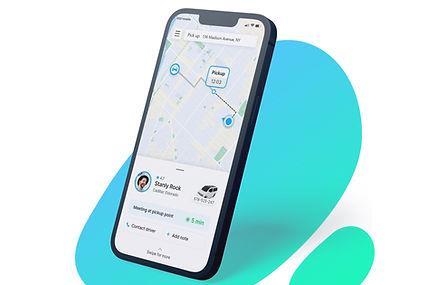
LYFT TO MAKE 'SIGNIFICANT' LAYOFFS TO REDUCE COSTS AND FREE UP INVESTMENT TO COMPETE
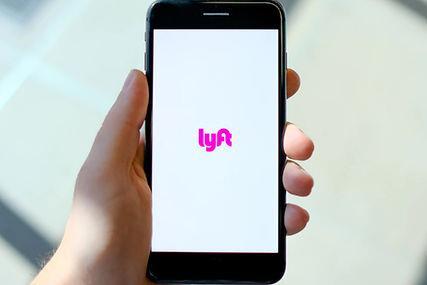
FREENOW have announced the launch of its taxi service in Eastbourne.
Vincent Franco, Hackney taxi driver and Committee member of the Eastbourne Hackney Taxi Association, said: “I’m delighted that Eastbourne Hackney taxi drivers are able to use the FREENOW app. Now local taxi drivers can benefit from the service and its unique benefits. The app is easy to use and gives me access to a huge customer base from the UK and Europe. This is a great advantage since it increases the chance to get more jobs from tourists and other visitors to the region.”
Lyft CEO David Risher recently announced that the company will make 'significant' layoffs to reduce costs and compete with Uber, boosting its shares by about 4%.
The company has not disclosed how many employees will be affected, but sources told the Wall Street Journal that it could be 30% of Lyft's workforce, or more than 4,000 workers.
36 | TAXIPOINT | MAY 2023 | EDITION 49 WWW.TAXI-POINT.CO.UK IMAGE CREDIT: AUTOFLEET
IMAGE CREDIT:
FREENOW
UBER GREEN RESERVE: UBER PASSENGERS CAN NOW RESERVE A GREEN RIDE UP TO 90 DAYS IN ADVANCE
Passengers in London have become much more concerned about the impact of climate change in recent years, with the vast majority calling for greater action on air pollution, according to a new Uber poll.
The polling comes as Uber launches Uber Green Reserve, which allows Londoners to book an all-electric ride up to 90 days in advance.
According to a survey of 1,000 Londoners, 85% say they are concerned about the health impacts of air pollution in the capital, with 77% calling for more to be done to tackle the problem.
Uber Green, which first launched in central London in 2021, allows riders to book a zero-emissions ride for the same price as a UberX. Drivers taking Uber Green trips also earn 10% more on those trips compared to UberX.
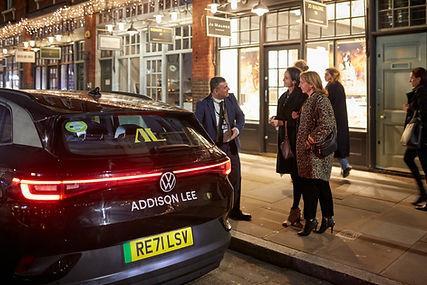


Now, with the new Green Reserve feature, riders can now book trips up to 90 days in advance for moments that require additional peace of mind – like a doctor’s appointment, important meetings, or airport trips – with the added bonus of those trips being completely emissions free.
Andrew Brem, General Manager of Uber UK, said: “We want Uber to be the cleanest platform on earth because it's the right thing for our riders and for towns and cities across the UK. By launching Uber Green Reserve, we want to provide riders with as many ways as possible to choose zero-emissions travel and help the environment.”
LONDON OPERATOR ADDISON LEE MORE THAN DOUBLES PROFIT IN 2022 FINANCIAL YEAR
Addison Lee announced its financial results, achieving an Adjusted EBITDA of £19.1 million for the year ended 31 August 2022 on a turnover of £218.5 million.
With private hire, EVs, courier, and taxi all available digitally and on one platform, the operator has seen unprecedented demand for its services, with a 33% yearon-year growth in passenger revenue.
Addison Lee’s CEO, Liam Griffin, said:
“
We’ve had a strong year, borne out by these financial results. The addition of black taxi and the growth of our EV fleet means that the company is thriving. As the only large operator trusted to hold a full 5-year licence from our industry regulator, we continue to be the clear partner of choice for passengers and London businesses looking for a premium, safe experience. We’re confident we’re perfectly positioned for continued strong growth.”
37 | TAXIPOINT | MAY 2023 | EDITION 49 WWW.TAXI-POINT.CO.UK
IMAGE CREDIT: UBER
IMAGE CREDIT: ADDISON LEE
BARNSLEY TAXI DRIVERS URGE COUNCIL TO RAISE TARIFFS TO STOP DRIVERS QUITTING INDUSTRY
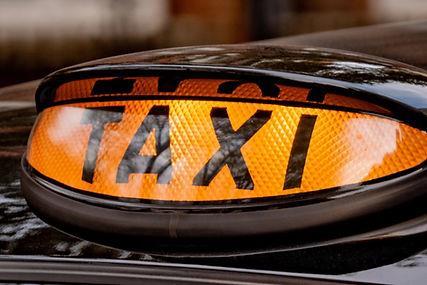
Barnsley's taxi drivers are struggling to keep their industry alive amidst mounting costs and cut-price tariffs.
They have now issued a warning that they will be forced to quit the industry if the council does not approve tariff increases soon.
Following a series of talks over the escalating situation, the general licensing board has agreed to review the proposal of increasing Hackney carriage fares in the town. Members of the board are expected to assess the views of the drivers before making a final decision on the matter.
Barnsley taxi drivers are hopeful that the council will favourably consider their plea to hike the fares from the current £4.20 to £4.50 for the first mile, and from £1.60 to £1.80 for every mile subsequently.
COURTS ORDER CHRISTMAS DAY BILKER TO PAY £126 FARE
Courts ordered a twenty-year-old man who bilked a taxi driver for £126 on Christmas Day to pay the fare.
Bilker Kai Bailey faced charges of making off without paying the £126 taxi fare owed during the festive period last year.
Bailey travelled in a taxi from Harrogate to Skipton. Bailey appeared at York Magistrates' Court on 26 April and pleaded guilty to the offence.
Magistrates ordered Bailey to pay compensation equating to the value of the fare to the taxi company.
No further order for costs or surcharge was made.
HERTFORDSHIRE TAXI DRIVERS REMINDED THEY MUST NOT REFUSE SHORT TRIPS UNLESS THEY HAVE A VALID REASON
Taxi drivers in Herefordshire have been reminded that they must not refuse short trips unless they have a valid reason.

This is because rejecting short journeys could put vulnerable people in danger, especially at night.
The council's licensing team has issued a warning to all taxi and private hire drivers that they could face enforcement action if they break the law. The law states that drivers can only refuse a fare if they have a reasonable excuse, such as being unwell, having a prior booking, or fearing for their safety.
Drivers who refuse short trips without good cause could be fined up to £1,000 or have their licence suspended or revoked.
38 | TAXIPOINT | MAY 2023 | EDITION 49 WWW.TAXI-POINT.CO.UK
REGIONAL NEWS
INSURANCE FINANCE









39 | TAXIPOINT | MAY 2023 | EDITION 49 WWW.TAXI-POINT.CO.UK
DISPATCH
EMISSIONS SYSTEMS APPS

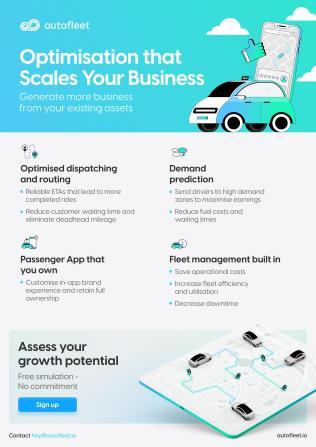



MEMBERSHIP CARD PAYMENTS




40 | TAXIPOINT | MAY 2023 | EDITION 49 WWW.TAXI-POINT.CO.UK



































































